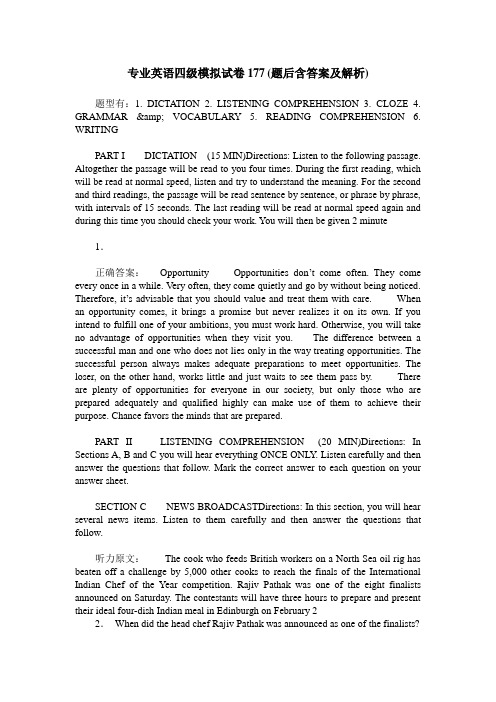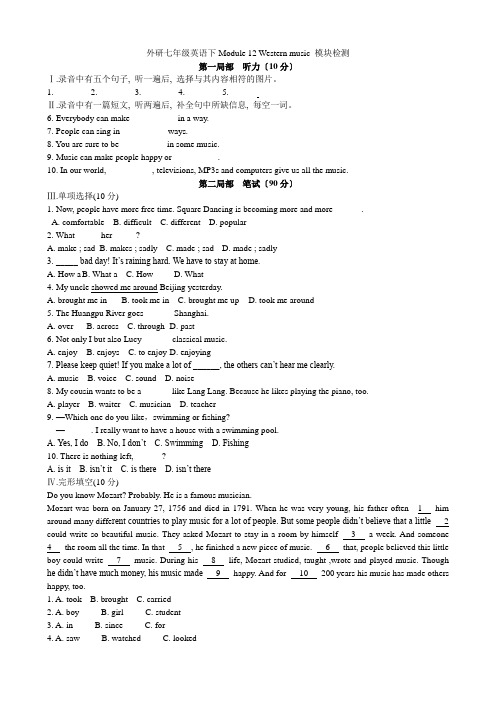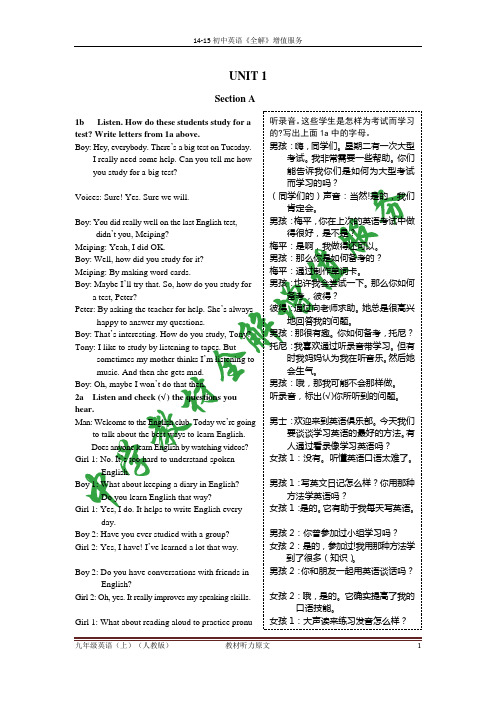J.C.Wells和他的《朗文英语发音词典》
- 格式:pdf
- 大小:138.62 KB
- 文档页数:3

专业英语四级模拟试卷177(题后含答案及解析)题型有:1. DICTATION 2. LISTENING COMPREHENSION 3. CLOZE 4. GRAMMAR & VOCABULARY 5. READING COMPREHENSION 6. WRITINGPART I DICTATION (15 MIN)Directions: Listen to the following passage. Altogether the passage will be read to you four times. During the first reading, which will be read at normal speed, listen and try to understand the meaning. For the second and third readings, the passage will be read sentence by sentence, or phrase by phrase, with intervals of 15 seconds. The last reading will be read at normal speed again and during this time you should check your work. You will then be given 2 minute 1.正确答案:Opportunity Opportunities don’t come often. They come every once in a while. Very often, they come quietly and go by without being noticed. Therefore, it’s advisable that you should value and treat them with care. When an opportunity comes, it brings a promise but never realizes it on its own. If you intend to fulfill one of your ambitions, you must work hard. Otherwise, you will take no advantage of opportunities when they visit you. The difference between a successful man and one who does not lies only in the way treating opportunities. The successful person always makes adequate preparations to meet opportunities. The loser, on the other hand, works little and just waits to see them pass by. There are plenty of opportunities for everyone in our society, but only those who are prepared adequately and qualified highly can make use of them to achieve their purpose. Chance favors the minds that are prepared.PART II LISTENING COMPREHENSION (20 MIN)Directions: In Sections A, B and C you will hear everything ONCE ONLY. Listen carefully and then answer the questions that follow. Mark the correct answer to each question on your answer sheet.SECTION C NEWS BROADCASTDirections: In this section, you will hear several news items. Listen to them carefully and then answer the questions that follow.听力原文:The cook who feeds British workers on a North Sea oil rig has beaten off a challenge by 5,000 other cooks to reach the finals of the International Indian Chef of the Year competition. Rajiv Pathak was one of the eight finalists announced on Saturday. The contestants will have three hours to prepare and present their ideal four-dish Indian meal in Edinburgh on February 22.When did the head chef Rajiv Pathak was announced as one of the finalists?A.It was three hours ago.B.It was in the last week.C.It was on Saturday.D.It was on February 25.正确答案:C听力原文:European leaders, trying to end their bitter dispute over Iraq, warned Saddam Hussein on Monday he faces a “last chance” to disarm, but gave no deadline and said U.N. weapons inspectors must have more time to finish their work. The statement came at the end of a European Union emergency summit on the crisis with Baghdad. Diplomats insisted they had healed the rift (裂口;空隙;分歧) over U.S. calls for military action. But significant divisions remained, with some states saying the United Nations could still disarm Iraq peacefully. “War is not inevitable. Force should be used only as a last resort. It is for the Iraqi regime to end this crisis by complying fully with the demands of the Security Council,” the 15 nations said in the joint declaration. That was seen as a setback for Germany, which has opposed war under any circumstances.3.European leaders trying to give Saddam HusseinA.a last resort.B.a warning.C.a deadline.D.a setback.正确答案:B解析:新闻的第一句话就是European leaders, trying to end their bitter dispute over Iraq, warned Saddam Hussein on Monday。

外研七年级英语下Module 12 Western music 模块检测第一局部听力〔10分〕Ⅰ.录音中有五个句子, 听一遍后, 选择与其内容相符的图片。
1. ______2. ______3. ______4. ______5. ______Ⅱ.录音中有一篇短文, 听两遍后, 补全句中所缺信息, 每空一词。
6. Everybody can make __________ in a way.7. People can sing in __________ ways.8. You are sure to be __________ in some music.9. Music can make people happy or __________.10. In our world, __________, televisions, MP3s and computers give us all the music.第二局部笔试〔90分〕Ⅲ.单项选择(10分)1. Now, people have more free time. Square Dancing is becoming more and more ______.A. comfortableB. difficultC. differentD. popular2. What _____ her _____?A. make ; sadB. makes ; sadlyC. made ; sadD. made ; sadly3. _____ bad day! It’s raining hard. We have to stay at home.A. How aB. What aC. HowD. What4. My uncle showed me around Beijing yesterday.A. brought me inB. took me inC. brought me upD. took me around5. The Huangpu River goes ______ Shanghai.A. overB. acrossC. throughD. past6. Not only I but also Lucy ______ classical music.A. enjoyB. enjoysC. to enjoyD. enjoying7. Please keep quiet! If you make a lot of ______, the others can’t hear me clearly.A. musicB. voiceC. soundD. noise8. My cousin wants to be a ______ like Lang Lang. Because he likes playing the piano, too.A. playerB. waiterC. musicianD. teacher9. —Which one do you like,swimming or fishing?—______. I really want to have a house with a swimming pool.A. Yes, I doB. No, I don’tC. SwimmingD. Fishing10. There is nothing left, ______?A. is itB. isn’t itC. is thereD. isn’t thereⅣ.完形填空(10分)Do you know Mozart? Probably. He is a famous musician.Mozart was born on January 27, 1756 and died in 1791. When he was very young, his father often 1 him around many diffe rent countries to play music for a lot of people. But some people didn’t believe that a little 2 could write so beautiful music. They asked Mozart to stay in a room by himself 3 a week. And someone 4 the room all the time. In that 5 , he finished a new piece of music. 6 that, people believed this little boy could write 7 music. During his 8 life, Mozart studied, taught ,wrote and played music. Though he didn’t have much money, his music made 9 happy. And for 10 200 years his music has made others happy, too.1. A. took B. brought C. carried2. A. boy B. girl C. student3. A. in B. since C. for4. A. saw B. watched C. looked5. A. day B. year C. week6. A. Before B. After C. About7. A. beautiful B. sad C. serious8. A. long B. short C. lively9. A. himself B. he C. herself10. A. more B. than C. overⅤ.阅读理解(20分)AIn Germany (德国), more than 70% of people like reading. They often read. They read in their homes. They read in libraries. They read in parks. They even read in hospitals. Parents often read books for kids.It is easy to buy books in Germany. There are many bookshops in Germany. They are in big cities and small towns. A bookshop can sell many books every day. Germans also like to buy books on theInternet. More and more people buy books on the Internet.In Germany, people often have reading parties. They are happy at the parties.1. What is the best title (标题) of the passage ?A. Germans like reading booksB. Germans like buying booksC. Germans like watching TVD. Germans like surfing the Internet2. Where can they buy books?A. bookshopsB. small towns.C. on the InternetD. everywhere3. What kind of parties do they have according to the passage?A. Birthday partiesB. New Year partiesC. Christmas partiesD. Reading parties4. If there are 10 Germans, ______ like reading.A. sixB. fiveC. sevenD. eight5. According to the passage, we can know Germans ______.A. have much moneyB. have good education (教育)C. have good jobsD. Have little knowledge (知识)BWe know music is very important in our daily (日常的) life. Do you notice music playing in many places? Today we hear music in most stores, stations, restaurants and other places. We can also hear music in an office or on a farm. Scientists believe that music influences (影响) people’s behavior (行为).They think that the sound of Western classical (古典) music makes people feel richer. When a restaurant plays classical music, people spend more money on food and drinks. When the restaurant plays modern music, people spend less money. Without music, people spend even less.Scientists also think that rock music makes people eat faster. Some restaurants play fast music during their busy hours. This makes people eat faster and leave quickly. Restaurants can make more money in this way.Some scientists think that music makes you think and learn better. They say that music helps students to be more active (活泼的). It is true that people learn better when they are relaxed. And listening to music can help you relax.6. Where can we hear music?A. In most storesB. In restaurantsC. In an office or on a farmD. A, B and C7. Scientists think Western classical music is ______.A. something with new stylesB. something making people feel richerC. something about mannersD. something making people work harder8. Which kind of music can make people eat faster?A. Light music.B. Rock music.C. Sweet music.D. Soft music.9. Listening to music can make a student ______.A. eat fastB. care about mannersC. more active in his / her studiesD. worry about his / her studies10. Which of the following can be the best title of the passage?A. Music and BehaviorB. Good and Bad MusicC. Kinds of MusicD. Music in RestaurantsⅥ.阅读表达(10分)J. K. Rowling was born in England in 1965. She loved reading, and wrote her first story, Rabbit, when she was only six years old. She studied French at university, then worked as a secretary in London. She had the idea for Harry Potter when she was on a train, “Harry just walked into my head,〞she said later. ①She started writing the first Harry Potter book the next day.In 1992 she went to live in Portugal and lived there for three years. She wrote Harry Potter in the morning, and worked as an English teacher in the afternoon and evening. She got married to a Portuguese TV journalist (记着) and had a daughter called Jessica.Then she returned to Britain and lived in Edinburgh, Scotland. She had no job at that time, she wrote in cafes because they were warmer than her small house. After five years she finished the first book, Harry Potter and the Philosopher’s Stone. The book was sold millions of copies all over the world. ②J. K. Rowling变的非常的著名。

2024外研剑桥(Join in)版五年级英语上册词汇复习笔记Word lists(粗体单词是需要掌握的核心单词,标星单词是超纲词)Starter unitbeautiful/ˈbju:tɪfl/美丽的,美好的(形容词)近义词:nice美好的 pretty漂亮的反义词:ugly丑陋的例句:Lisa has got a beautiful bird. 莉萨有一只美丽的鸟。
clean/kli:n/(把……)弄干净(动词)发音:ea发/i:/。
动词-ing 形式:cleaning例句:I’m cleaning my teeth. 我正在刷牙。
其他词义:clean打扫hard/hɑ:d/费劲地;费力地(副词)发音:ar发/ɑ:/。
例句:Don’t kick it so hard!别这么用力踢它!其他词义:hard努力地learn /lɜ:n/学习;学会(动词)发音:ear发/ɜ:/。
近义词:study 学习短语:learn from 向……学习例句:I’m learning to play the piano. 我正在学习弹钢琴。
New South Wales 新南威尔士州例句:New South Wales is in the southeast of Australia.新南威尔士州位于澳大利亚的东南部。
soon/su:n/不久,很快(副词)发音:oo发/u:/。
形近词:noon中午例句:He will be back soon. 他很快就会回来。
summer holiday暑假例句:What will you do during the summer holiday?暑假期间你将要做什么?联想:winter holiday 寒假take/teɪk/拍摄(动词)发音:a发/eɪ/。
动词-ing 形式:taking以不发音的字母e结尾的动词变动词-ing形式时,先去掉e,再加-ing。
例句:My parents like taking photos in the park.我父母喜欢在公园里拍照。

UNIT 1 Section APaul: Maybe I’ll go. The only other problem is that I don’t get much writing practice.Ms. Manson: Maybe you should find a pen pal. Paul: That sounds like a fun way to practice writing.Thanks, Ms. Manson.UNIT 2Section A1b Listen and T for true or F for false. Mary: What a great day!Bill: Yes, it was really fun!Mary: What did you like best?Bill: I loved the races! They were really interesting to watch. How fantastic the dragon boat teamswere!Mary: Yes! And look at the colors of the boats.How pretty they were!Bill: I agree! But I guess it was a little too crowded. Mary: I don’t know…I kind of like to have more people around. It makes things more exciting. Bill: That’s true. Oh, and I really liked eating zongzi. Mary: Oh, me too! The sweet ones are my favorite.Bill: I wonder if they’ll have the races again next year.Mary: Of course! They have them every year. Bill: Then I believe that I’ll be back again next year to watch the races!Mary: Me, too!2a Listen to the conversation between Wu Ming and Harry and the correct words in the sentences.Harry: What did you do on your vacation, Wu Ming? Wu Ming: I visited my aunt and uncle in Hong Kong.Harry: Wow! So what did you do?Wu Ming: Well, we ate out a lot. I believe that we ate at least five meals a day! How delicious thefood is! I’ve put on five pounds!Harry: Haha! Yes, the food in Hong Kong is delicious.What else did you do?Wu Ming: Shopping, of course. Hong Kong is a great place for shopping! I spent so much money. 保罗:也许我会去。

第一讲:44个国际音标----爆破音(6个)第一讲44个国际音标----爆破音(6个)第一部分:要领总结爆破音:一共六个,有爆发力,短促有力。
第二部分:发音要领/p/ 由嘴形变化产生的音,清辅音,与随之而来的音自然融合。
/b/ 由嘴形变化产生的音,浊辅音,与随之而来的音自然融合,就像拼音。
/t/ 由舌和上齿龈阻止气流产生的音,清辅音。
/d/ 由舌和上齿龈阻止气流产生的音,浊辅音。
/k/ 口腔后部产生的音,软鄂与舌后部轻轻碰撞,清辅音。
/g/ 口腔后部产生的音,软鄂与舌后部轻轻碰撞,浊辅音。
发音实例作证第三部分:实例作证1)pea two peas in a pod They are like two peas in a pod.2)potato small potato I am just a small potato.3)beat beat sb. It beats me.4)bath take a bath He is taking a bath.5)tea one’s cup of tea She is not my cup of tea.6)treat one’s treat It is my treat this time.7)mood in a good mood I am not in a good mood today.8)wooden wooden shoes People in Holand like to wear wooden shoes.9)come come to the point Stop talking nonsense. Let’s come to the point.10)green green hand Tom is a green hand in this firm.辨音纠正第五部分:辨音纠正请跟读模仿,并同时注意单词中元音的发音。
pat batpie buylap labtuck duckkitty kiddywriting ridingcame gamecoast ghostpick pigduck dug课后作业(模仿素材)第六部分:课下作业(模仿素材)My name is Tom. I graduated from Peking University and majored in English. There are three people in my family. My father works in a computer company. And my mother is a housewife. I am the youngest one in my family.In my spare time, I like to read novels. I think reading could enlarge my knowledge. As for novels, I could imagine whatever I like such as a well-known scientist or a kung-fu master. In addition to reading, I also like to play PC games. A lot of grownups think playing PC games hinders the students from learning. But I think PC games could motivate me to learn something such as English or Japanese.Introduce your family?What is your opinion on part-time jobs? (a way to gain experience, to support my study )What is your opinion on your laid-off workers?(not incapable ,can do great things ,start from scratch)第一部分:上一讲复习及本讲主要内容介绍44个国际音标----摩擦音和破擦音(9+2个)第一部分:上一讲复习及本讲主要内容介绍1、什么是摩擦音?2、什么识破擦音?第二部分:发音要领第二部分:发音要领1、/f/ 唇齿音,上齿咬下唇里三分之一的位置,清辅音。

48个英语国际音标读法(中文谐音发音方法)元音音素:/i:/ 【衣发长点】/I/【衣急促地发声】/e/ 【哎发这个音的时候不要把“哎”的ī给读出来,嘴唇放松自然地读】/æ/【哎发这个音的时候不要把“哎”的ī给读出来,嘴唇扁平地发】/ə:/【额发长音】/ə/【额发短音】/∧/【阿嘴巴微微地张开发出这个音就可以了】/a:/【啊嘴巴长到最大】/ככ/【哦急促】/כ:/ 【哦声音拖长】/u/ 【乌急促】/u:/【乌声音拖长】/eI/【有点像答应人的“诶”的声音】/aI/【唉】/כI/【哦-喂连着读】/əu/【呕】/au/【傲】/Iə/【衣-饿连着读】/εə/【哎-饿连着读】/uə/【乌-饿连着读】辅音音素:/p/【普不要把ǔ给发出来,轻音】/b/ 【不不要把ù给发出来,浊音】/t/【特不要把è给发出来,轻音】/d/【得不要把é给发出来,浊音】/k/【克不要把è给发出来,轻音】/g/【各不要把è给发出来,浊音】/f/ 【福不要把ú给发出来,轻音】/v/【有点像摩托车启动的声音,“呜呜呜”地,但是是像发“vúvúvú”一样,不要把ú给发出来,浊音】/s/【丝像蛇吐芯子发出的那种声音,不要把ī给读出来,轻音】/z/【就是/s/的浊音】/θ/【牙齿咬住舌头的轻音】/δ/【牙齿咬住舌头的浊音】/∫/【西不要把ī给发出来,轻音】/з/ 【衣不要把ī给发出来,浊音】/h/【喝不要把ē给发出来,轻音】/r/【若不要把uò给发出来,浊音】/t∫/【七不要把ī给发出来,轻音】/dз/【姬不要把ī给发出来,浊音】/tr/ 【缺不要把uē给发出来,轻音】/dr/【撅不要把uē给发出来,浊音】/ts/【次不要把ì给发出来,轻音】/dz/【自不要把ì给发出来,浊音】/m/【嘴巴闭住,然后发音,气流从鼻子出来,浊音】/n/【嘴巴微张,舌尖顶住上颚,气流从鼻子出来而不是从嘴巴出来,浊音】/ŋ/【嘴巴长大,舌头向下弯曲,气流从鼻子出来而不是从嘴巴出来,浊音】/l/【有两个读音。
3000英语单词(精华版)-CAL-FENGHAI.-(YICAI)-Company One1妙语速记3000英文单词 16叶是900句---近形编句速记法速成3000常用英语单词(缩略精华版)刘伊翰编著(购买办法:新华发行集团各大书店有售,定价12元/本;羊城晚报出版社或作者均可邮购,加15%邮费)前言中国加入wto了!英语作为人们谋生发展的工具越发显得重要起来,甚至有人把文盲的范畴扩大到不懂外语的人,很多人都希望精通英语以为自己的生存和发展创造优势,然而,缺乏充足的时间和精力,缺少真正高效实用的学习方法和辅助工具,以低效乏味的记忆方式,面对数以万计的英语词汇和惊人的遗忘速度,这是一场多么没有希望的战斗,多少人经过长年累月的争扎,不得不退出了战场……如果您曾大规模记忆英语单词,您一定会发现,有很多英文单词的词义完全不同,但拼写方式却十分相似,例如“doe、foe、joe、hoe、roe、toe、woe”等等,这些词在拼写方面相互之间只相差一个字母,但词义完全不同,人们很容易把这些词混淆弄错,尤其是那些字母数不多的短词,由于这些短词音节不明显并且很多读音相近,所以语音法难以凑效;又由于这些短词的拼写结构简单缺乏内部字根构造,所以构词法对这些词也是束手无策,因而字母数少的短词更令人烦恼。
究竟有没有一种方法,能够有效避免常见短词的混淆并且能够有效提高对这些短词的记忆效率?答案是有的,笔者通过多年的研究,并运作电子计算机数据库技术对大量基础词汇进行了数亿次的词词比效运算,创造了一种实用有效的记忆方法,能够非常有效地解决上述的问题。
笔者把大量拼写只差一个字母的词汇集中在一起编成一个个记忆小组,并利用组内词汇的不同词义编成有意义的句子进行记忆,这种方法不仅能够有效避免混淆,而且大大提高了记忆的效率并加强了记忆的牢固度,例如把“doe、foe、joe、hoe、roe、toe、woe”编成“悲衷的乔锄了敌人的脚趾头得到了母鹿和鱼子”,这样您不是很容易便永远记住了这七个词了吗,本书正是基于这种思想,通过对18000多条英语基本单词进行了比对分析,完成了对大量近形易混词的编组和编句工作,力图让广大读者分享一种能够举一反三、事半功倍地牢记大量的基本单词的速记法。
初二(上)课文(翻译)1—4Unit 1 Look it up! 查阅这里是两篇来自百科全书的文章。
Here are two articles['ɑːtɪk(ə)l]文章 from an encyclopaedia [ɪn,saɪklə'pidɪə]百科全书.达芬奇·莱昂纳多Da Vinci, Leanardo达芬奇·莱昂纳多(1452-1519)是意大利画家、发明家、音乐家、工程师和科学家。
Leanardo da Vinci (1452—1519) was an Italian painter['peɪntə]画家, inventor[ɪn'ventə]发明家, musician [mjuː'zɪʃ(ə)n]音乐家, engineer [endʒɪ'nɪə] 工程师and scientist.达芬奇出生在农村。
从很小的时候,他就表现出极大的智慧和艺术能力。
随着年龄的增长,他学会了做很多不同的事情。
他的画是非常有名的,其中一副,《蒙娜丽莎》,也许是世界上最有名的画作。
他还有许多发明。
例如,他的笔记本里有一些关于飞行器的有趣的图纸。
Da Vinci was born in出生于 the countryside['kʌntrɪsaɪd]农村. From an early age从早期开始, he showed great intelligence[ɪn'telɪdʒ(ə)ns] 智慧and artistic ability[ɑː'tɪstɪk] [ə'bɪləti]艺术才能. As当;随着 he grew older, he learnt to do many different things. His paintings['peɪntɪŋ]画作 are very famous, and one, the Mona Lisa, is perhaps the most famous painting in the world. He also had many inventions[ɪn'venʃ(ə)n]发明. For example, his notebooks['nəʊtbʊk]笔记本include[ɪn'kluːd]包括some interesting drawings['drɔː(r)ɪŋ]绘画of flying machines [mə'ʃiːn]飞行器.Dinosaurs['daɪnəsɔː]恐龙恐龙比人类早 6000万年就生活在地球上。
外研社版三年级起点五年级下册全册知识汇总含音标语音、单词词汇、词组短语、句子句型Module 1知识汇总一、语音知识ai ——[eɪ] ——rain, main, waital ——[ɔ:] ——walk, talk, tallar ——[eɪ] ——farmer, far, park, partyay ——[eɪ] ——play, may, day, sayau ——[ɔ:] ——autumn, August, authorar ——[ɔː] ——warm, quarter, war二、词汇still还,仍然programme(电视或广播)节目lady女士,夫人life生活different不同的ago以前interviewer采访者enough足够的television电视机grandchildren(grandchild的复数形式)(外)孙子;(外)孙女change改变,变化night夜晚,夜间work工作;劳动;干活儿field田地fire火,炉火or(用于否定句中)也不,也没radio收音机telephone电话couldn't = could not不能write写hope希望三、短语live in住在......watch TV看电视a small village一个小村庄talk about谈论in the fields在田地里last night昨天晚上every day每天enough food足够的食物lots of许多a television programme一个电视节目四、句子1. There are two beautiful cats on the chair. 有两只漂亮的小猫在椅子上。
2. Life was very different in China many years ago. 在许多年前中国的生活对于现在有着很大的区别。
3. We lived in a small house. We didn’t have enough food. There weren’t many buses. There weren’t any televisions. 我们住在小房子了里。
J. C. Wells和他的《朗文英语发音词典》(代序)史宝辉伦敦大学院①的语音学及语言学系是语音学家的摇篮,该系的前身是语音学系,早在1866年就有Alexander Melville Bell在此进行语音讲座,他的儿子Alexander Graham Bell当时是该校的学生,就是后来发明电话的那个人。
1907年Daniel Jones正式受聘于此,开始系统讲授语音学课程,1921年成为该校首位语音学教授,到1949年他退休时该系已具有了广泛的国际影响。
迄今为止,已有三代语音学大师在此工作:第一代是Daniel Jones (1881-1967)和J. R. Firth (1890-1960)②, 第二代主要有D. B. Fry (1907-1983)、A. C. Gimson (1917-1985)、J. D. O’Connor (1919-1998)和Gordon Arnold (1920-1999)等人,第三代则以J. C. Wells为代表。
这里的英语语音学大师们编写和出版了大量有关英语语音及语音学的著作和教材,其中Jones编写的《英语语音学纲要》和Gimson编写的《英语语音教程》分别在不同时期被看作是关于英式正统发音(RP)的标准教科书。
另有两部关于英语语音的专门词典在这里诞生:一是Daniel Jones的《英语发音词典》,初版于1917年,后经其本人和A. C. Gimson、Peter Roach 等人多次修订,到2003年已出第16版。
另一部就是J. C. Wells编的这本《朗文英语发音词典》,1990年初版,2000年修订二版。
本书作者John Christopher Wells教授于1939年3月11日出生,1960年剑桥大学毕业后入伦敦大学院专攻语音学,成为Gimson、O’Connor等人的学生,1962年获硕士学位,1971年又获伦敦大学院博士学位。
他自获硕士学位后即在伦敦大学院语音学及语言学系任教,历任助教、讲师、副教授、教授职务,1988年起任语音学教授至今,并于1990-2000年间担任该系系主任职务。
他于1996年当选不列颠研究院院士③,2003年出任国际语音学会理事长④之职。
20世纪前半叶,语言学的研究方法逐渐从“规定”转向“描写”,影响到Wells对自己从事英语语音研究的认识。
Wells颇得Gimson体系的真传,他留校工作并成为第三代的领军人物,曾经过了Jones大师的亲自考核并得到首肯⑤,但是他本人并不满足于传承老师的衣钵。
他从一开始就给老师的体系提出了许多需要改进的地方,以至于后来出版社不敢让他来修订①University College London (UCL),伦敦大学50多个组成学院中最大的一个,由72个系组成,实际上其自身就是一所一流的综合大学。
(/)②J. R. Firth在此工作10年后调到伦敦大学亚非学院。
③Fellow of the British Academy (FBA)。
不列颠研究院是英国于1902年起为人文和社会科学学科设立的院士选拔和科研资助机构,与为自然科学设立的“皇家学会(The Royal Society)”相对应。
不列颠研究院即英国的人文及社会科学院,每年按18个分支学部选拔35名左右在人文和社会科学研究方面做出突出贡献的专家学者授予其院士称号。
参加选拔者年龄不得超过70岁,入选后称为普通院士(ordinary fellows),院士年龄超过70岁后改称为资深院士(senior fellows)。
(/)④President of the International Phonetic Association (IPA),国际语音学会理事长每四年改选一次,Wells此次任期为2003-2007年。
(/IPA/index.html)⑤关于Wells的学术道路,见他本人的回忆文章“My Personal History”(/home/wells/philsoc-bio.htm)。
Jones的语音词典。
不过,这也导致了他两部重要著作的诞生:耗时12年完成的三卷巨著《英语的口音》(Accents of English, 1982),以及现在我们手里这部发音词典。
而Jones发音词典和Gimson语音教程这两部经典著作的修订工作则分别由毕业于该系后在其他学校任教的另外两位教授承担了。
Wells在英语语音研究方面的突破,在于他对不同口音以及RP语音演变所进行的深入细致的研究。
尽管此前Jones和Gimson对英语语音进行描述时经常提及地方音的问题,但他们一直是以RP为核心的,从未试图对英语的口音进行全面细致的调查和描述。
《英语的口音》第一卷提出口音不仅受地域的影响,还需考察社会因素(如社会阶层、场合、年龄、性别等)对口音造成的影响。
第二卷对英格兰、威尔士、苏格兰和爱尔兰的地方口音进行了详尽的描述,第三卷包括美国、加拿大、西印度群岛、澳大利亚、新西兰、南非、印度、非洲、远东等国家和地区英语口音的描述。
该书配有磁带,是一部内容翔实的研究著作,具有很高的学术价值。
Wells对于RP语音演变的研究主要是1988年和1998年所做的两次语音调查⑥,其最终成果就是这本发音词典。
调查采取问卷形式,第一次调查有275人回答了问卷,第二次调查则有1932人参与了答卷。
调查的结果不但得出音段和超音段上的变化趋势,而且得出年龄等社会因素的变化趋势。
举例来说,1988年的调查就发现,zebra一词中的第一个元音有83%的答卷人发成/e/,只有17%的答卷人发成/i:/,本词典在867-868页上报告了这一调查结果,并在该词条中将多数人的发音列在前面。
同时,调查还发现答卷人中年青人更倾向于/e/,年长者倾向于/i:/,表现出发音变化的趋势。
词典中有200多处这样的图示,表明发音变化的倾向。
再来看超音段特征的变化:众所周知,英语词重音的位置规律性不强,所以在词典中必须给予明确的反映,但随着英语在各个方面发生变化,词重音的位置也处于演变过程中。
Jones早在其《英语的发音》(1956)一书中就已注意到英语词重音发生位移的现象,后来Gimson 和他的学生也在《英语语音教程》的不同版本中进一步反映了这个问题。
当然,重音的变化是一个相当缓慢的过程。
Jones曾列出具有重音转换趋势的10个例词:hóspitable Æ hospítable ápplicable Æ applícableinéxplicable Æ inexplícable éxquisite Æexquísitefórmidable Æ formídable dírigible Æ dirígiblecóntroversy Æ contróversy ínteresting Æ interéstingjústifiable Æ justifíable íntricate ÆintrícateWells在本词典中记录了部分英语词的重音变化在1988年、1998年两次对英国人的调查和1993年对美国人的调查结果,表明经过近半个世纪的时间,Jones所注意到的重音变化趋势并没有全部完成,其中除hospítable、applícable、exquísite、inexplícable和justifíable现已成为主要发音形式外,formídable、dirígible和contróversy仍为次要发音形式,interésting和intrícate⑥ Wells的许多研究文章和语音调查结果可见其网页上的相关链接(/home/wells/)。
两种发音形式未被收录,说明使用者甚少(见下表)。
语音调查结果(%)变化后发音英(1988) 英(1998) 美(1993)本词典中的标注hospítable 81 --主要发音形式applícable 77 84 36 主要发音形式exquísite 69 -76 主要发音形式inexplícable ---主要发音形式formídable 46 -68 次要发音形式dirígible ---次要发音形式contróversy 56 60 -英式英语为次要发音形式美式英语为唯一发音形式interésting ---未收录此形式intrícate ---未收录此形式justifíable -82 75 主要发音形式词重音的位置显然出现了向右移动,这种移动是有意义的,因为移动的趋势是从不规则的重音位置到规则的重音位置,即“倒数第三个音节”。
语言的演变是一个长期的过程,因此我们尽管可以看出一些倾向性的变化趋势,但英语词重音位置向规则化演变的这一过程现在还远远没有完成。
词典还收录了大量人名、地名等专有名词的发音,例如我们可以知道语音学家Gimson 的第一个辅音是/g/,但在其他人的名字中可能念/dV/,Burberry的第一个元音是/\:/而不是/B:/等。
《朗文英语发音词典》的创新之处在于,作者在大量调查研究的基础上对英式英语和美式英语的使用现状做出了客观的描述,因此其权威性优于坊间其他同类词典。
商务印书馆决定在我国出版此书,对广大英语教师(特别是教授英语发音和口语的教师)及想要出国留学又担心自己的发音不够“地道”的人士将是一个福音,它有益于我国英语学习者学会当代的英语发音。
同时,该书还为我国英语教材编写和英语词典编纂中对于词语发音的标注提供了一部不可或缺的参考文献。
2004年国庆于亚运村(作者为北京林业大学外语学院院长、教授、语言学博士)(本文为商务印书馆引进版而作)。